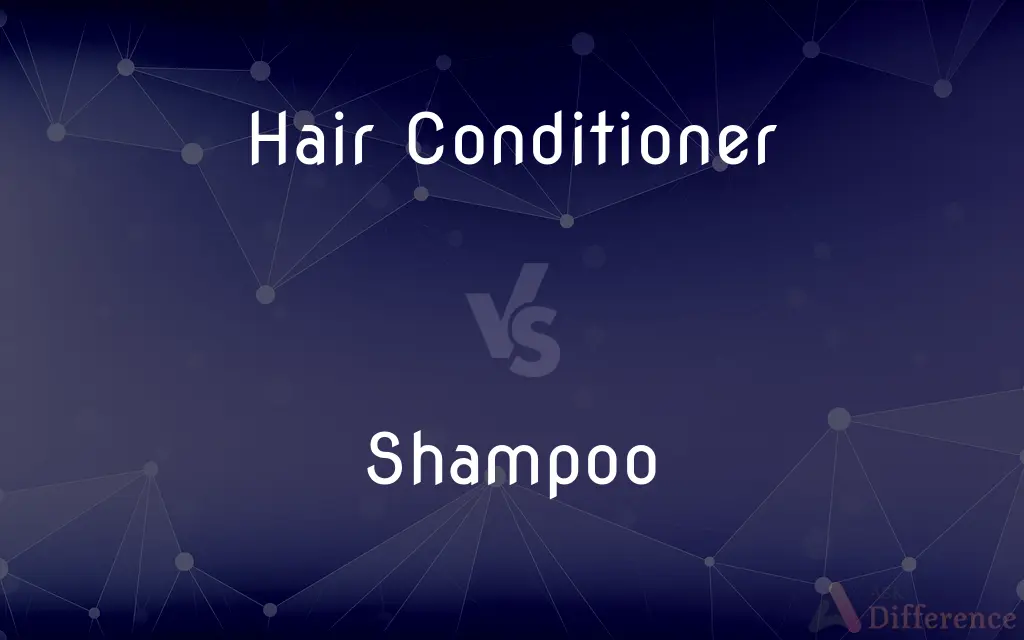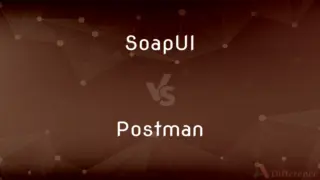Hair Conditioner vs. Shampoo — What's the Difference?
By Tayyaba Rehman — Published on January 15, 2024
Shampoo cleanses the scalp and hair, removing dirt and oil, while conditioner smooths and hydrates hair, improving its texture and manageability.

Difference Between Hair Conditioner and Shampoo
Table of Contents
ADVERTISEMENT
Key Differences
Primary Function: Hair conditioner is formulated to nourish and hydrate hair, often used after shampooing to replenish moisture. Shampoo, on the other hand, is designed to cleanse the hair and scalp, removing dirt, oil, and product buildup.
Application and Use: Conditioner is typically applied to the lengths and ends of the hair, avoiding the scalp, to avoid greasiness. Shampoo is massaged into the scalp and throughout the hair to create lather for effective cleansing.
Ingredients and Benefits: Hair conditioners often contain ingredients like silicones, oils, and emollients to smoothen and detangle hair. Shampoos are formulated with surfactants and cleansing agents to effectively remove impurities from the hair and scalp.
Effect on Hair: Regular use of conditioner helps in reducing frizz, making hair more manageable and soft. Shampooing primarily focuses on cleaning and can sometimes strip hair of its natural oils, necessitating the use of a conditioner afterward.
Varieties and Special Formulations: There are various types of conditioners, including leave-in and deep conditioners, catering to different hair needs. Shampoos come in various formulations, including clarifying, volumizing, and moisturizing, to suit different hair types and concerns.
ADVERTISEMENT
Comparison Chart
Primary Purpose
Hydrate and nourish hair
Cleanse scalp and hair
Application Area
Lengths and ends of hair
Scalp and throughout hair
Key Ingredients
Silicones, oils, emollients
Surfactants, cleansing agents
Main Effect
Smoothens and detangles hair
Removes dirt and oil
Varieties
Leave-in, deep conditioners
Clarifying, volumizing, etc.
Compare with Definitions
Hair Conditioner
Conditioner moisturizes and detangles hair, preventing breakage.
Using hair conditioner has made combing my thick hair much easier.
Shampoo
Available in various types, like moisturizing or volumizing.
I switched to a volumizing shampoo to give my hair more body.
Hair Conditioner
Comes in various forms like leave-in and deep conditioners.
For extra care, I use a deep hair conditioner once a week.
Shampoo
Regular use helps maintain a healthy scalp and hair.
Using shampoo regularly keeps my hair looking fresh and clean.
Hair Conditioner
Often contains nourishing ingredients like oils and silicones.
My hair conditioner with argan oil leaves my hair feeling silky.
Shampoo
A hair care product designed to clean the scalp and hair.
I use shampoo every other day to keep my scalp clean and healthy.
Hair Conditioner
Applied mainly to the ends of the hair to avoid greasy roots.
I focus the conditioner on the ends to hydrate my dry tips.
Shampoo
Contains surfactants that create lather for effective cleansing.
The rich lather of my shampoo ensures thorough cleaning.
Hair Conditioner
A hair care product used to improve hair's texture and manageability.
After shampooing, I always apply hair conditioner to keep my hair smooth.
Shampoo
Shampoo removes dirt, oil, and product buildup from hair.
A good shampoo is key to removing all the styling products I use.
Shampoo
Any of various liquid or cream preparations of soap or detergent used to wash the hair and scalp.
Shampoo
Any of various cleaning agents for rugs, upholstery, or cars.
Shampoo
The act or process of washing or cleaning with shampoo.
Shampoo
To wash or undergo washing with shampoo.
Shampoo
(originally) A traditional Indian and Persian body massage given after pouring warm water over the body and rubbing it with extracts from herbs.
Shampoo
A commercial liquid soap product for washing hair or other fibres/fibers, such as carpets.
Shampoo
An instance of washing the hair or other fibres with shampoo.
I’m going to give the carpet a shampoo.
Shampoo
Champagne.
Shampoo
(intransitive) To wash one's own hair with shampoo.
My neat-freak of a friend has been compulsively shampooing for every bath he has taken.
Shampoo
(transitive) To wash (i.e. the hair, carpet, etc.) with shampoo.
Shampoo
(transitive) To press or knead the whole surface of the body of (a person), and at the same time to stretch the limbs and joints, in connection with the hot bath.
Shampoo
To press or knead the whole surface of the body of (a person), and at the same time to stretch the limbs and joints, in connection with the hot bath.
Shampoo
To wash throughly and rub the head of (a person), with the fingers, using either soap, or a soapy preparation, for the more thorough cleansing.
Shampoo
The act of shampooing.
Shampoo
Cleansing agent consisting of soaps or detergents used for washing the hair
Shampoo
The act of washing your hair with shampoo
Shampoo
Use shampoo on (hair)
Common Curiosities
What are the benefits of using conditioner?
It helps hydrate, detangle, and smooth hair, making it more manageable.
Is leave-in conditioner different from regular conditioner?
Yes, leave-in conditioner is lighter and designed to be left in the hair.
Should conditioner be applied to the scalp?
No, it's best applied to the lengths and ends of the hair to avoid greasiness.
How often should I use shampoo?
It varies, but generally, 2-3 times a week is sufficient for most hair types.
Can shampoo be used daily?
It depends on hair type; some may need daily washing, while others may not.
Is there a difference in shampoo for different hair types?
Yes, there are various shampoos formulated for specific hair types and needs.
What is hair conditioner?
It's a product used after shampooing to moisturize and improve hair's texture.
How does shampoo work?
Shampoo cleanses the scalp and hair by removing dirt, oil, and product residues.
Does conditioner help with hair growth?
While it doesn't directly stimulate growth, it prevents breakage and aids overall hair health.
Why do some shampoos cause dryness?
Shampoos with strong cleansers can strip natural oils, leading to dryness.
Can conditioner repair damaged hair?
It can help improve the appearance of damaged hair but can't repair it entirely.
Can I use conditioner without shampoo?
Yes, but for best results, it's recommended to use it after shampooing.
Do shampoos expire?
Yes, shampoos have a shelf life and can expire, typically within 12-24 months.
Are there sulfate-free shampoos?
Yes, many shampoos are sulfate-free, which can be gentler on the hair and scalp.
Is conditioner necessary for all hair types?
While not mandatory, it's beneficial for most hair types to maintain health and manageability.
Share Your Discovery

Previous Comparison
Sodium Lauryl Sulfate vs. Sodium Lauroyl Sarcosinate
Next Comparison
SoapUI vs. PostmanAuthor Spotlight
Written by
Tayyaba RehmanTayyaba Rehman is a distinguished writer, currently serving as a primary contributor to askdifference.com. As a researcher in semantics and etymology, Tayyaba's passion for the complexity of languages and their distinctions has found a perfect home on the platform. Tayyaba delves into the intricacies of language, distinguishing between commonly confused words and phrases, thereby providing clarity for readers worldwide.











































